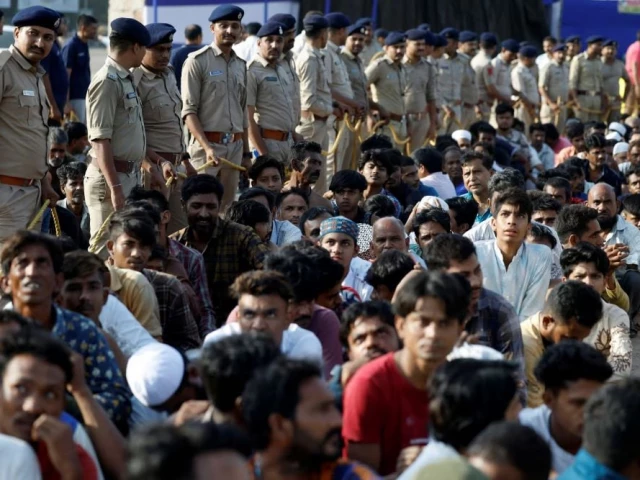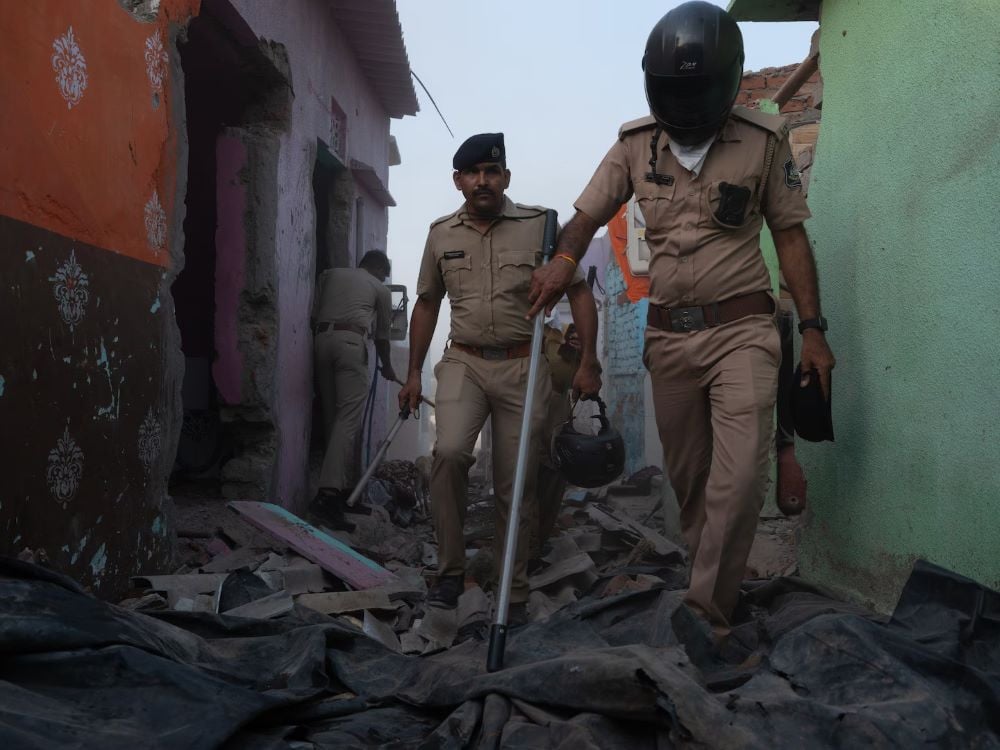India forcibly deported nearly 1,900 Muslims after Pahalgam attack: report
Some deportees were Indian citizens; rights groups slam deportations as illegal and abusive, citing destroyed IDs

Following a deadly militant attack in Kashmir, Indian authorities launched a deportation campaign targeting Muslims, allegedly expelling nearly 1,900 people to Bangladesh, many without legal process, according to a report by The Washington Post.
Testimonies and documents indicate that some deportees were even Indian citizens. Victims describe police brutality, destruction of identity papers, and forced deportation by sea or foot. Human rights groups and legal experts have condemned the drive as a clear violation of international law.
Hasan Shah, a waste picker from Gujarat, India, woke to a nightmare in April. Dragged from his bed by police, blindfolded and tied, he was forcibly taken to the sea and ordered at gunpoint to leap into the water near the Bangladesh coast. “Jump into the water,” he recalled officers telling him. “If you look back, we’ll shoot you.”
‘Keeping Muslims in line’
— 𝑪𝒂𝒕𝒂𝒍𝒆𝒚𝒂🛡 (@catale7a) July 12, 2025
“Jump into the water. If you look back, we’ll shoot you.” - Indian police officers to Hasan Shah, an Indian Muslim, born in Gujarat
👺The documents proving his Indian citizenship were snatched by police when they detained him in his hometown, Surat. pic.twitter.com/adgbgt5kid
Three days later, Shah swam ashore and was picked up by the Bangladeshi coast guard near Satkhira. His documents proving Indian citizenship were confiscated, leaving him stateless and stranded. “This isn’t my home,” Shah said, standing outside a courthouse. “I need to go back to India. I need to get back to my kids.”
Shah is one of nearly 1,900 people—mostly Muslims—who were deported from India to Bangladesh between 7 May and 3 July, according to confidential Bangladeshi government data.
These expulsions followed a militant attack in Kashmir in April that left 26 dead. In the days after, Indian authorities launched sweeping raids, demolitions, and deportations in Muslim-majority neighbourhoods, particularly in Gujarat and Assam.
Arbitrary arrests and statelessness
The Gujarat state home minister, Harsh Sanghavi, declared a crackdown on “each and every infiltrator.” While some detainees were undocumented, others like Shah appeared to be Indian citizens, some even holding voter IDs and national identity cards.
Shah’s family provided The Washington Post with evidence of his Indian citizenship, including verified identity documents and voter registration. His mobile phone, needed to authenticate those documents, is reportedly still held by police.

Eleven deportees interviewed said they were denied the opportunity to present proof of their legal status. Several reported that their original papers were seized or destroyed, and copies they later provided were dismissed as fake.
Human rights concerns
Human rights experts are alarmed. “The deportation drive does not just violate civil rights,” said Mohsin Alam Bhat, a law lecturer at Queen Mary University of London. “It clearly violates international law.”
Video evidence obtained by The Post shows disturbing scenes, including an elderly woman pleading not to be left across the Bangladesh border. She was readmitted to India but has since disappeared.
Bangladesh has issued diplomatic protests. India’s Ministry of External Affairs and Border Security Force did not respond to requests for comment.
Mass raids, demolitions, and abuse
In Ahmedabad’s Chandola Lake area, 890 people—including over 200 women and children—were detained in a late April raid. Many were forced to march for hours in extreme heat while media filmed the operation. Over 12,500 homes were bulldozed in the aftermath, displacing thousands.
Parveen Ismail Rangrez watched her home destroyed. “Everything is wiped out now,” she said.
Yunus Khan Pathan, another resident, was arrested, made to march until the soles of his feet burned, and released—only to return and find his house gone. “Prove that I’m a terrorist,” he said. “All I have is a Muslim name.”
The People’s Union for Civil Liberties estimated only about 50 of those detained may have lacked legal status. Public dissent was limited due to fear of being labelled “anti-national.”
“The public opinion is: ‘They are keeping Muslims in line,’” said Mujahid Nafees, PUCL’s Gujarat chapter general secretary
Torture and forced confession
Abdur Rahman, 20, was arrested without a warrant at 4 a.m. on 26 April. He alleges he was whipped with a leather belt in custody and pressured into falsely claiming Bangladeshi nationality.
“They beat me brutally,” he said, showing deep purple bruises across his torso. Like Shah, he was given a life jacket and forced overboard near the Sundarbans.
Rahman’s identity card and school certificate—verified by The Post—show he was born in Ahmedabad.
“You want a whole group to disappear,” said Rudabeh Shahid, a nonresident fellow at the Atlantic Council. “I have no other ways to describe this.”
Night-time deportations across land borders
India is also deporting detainees on foot. According to Lt. Col. Mehedee Imam, a Bangladeshi border guard commander, Indian forces switch off floodlights and quietly force people into the no-man’s-land at night.
“It is unlawful,” Imam said. “There is a process in place to verify nationality.”
A video shows one woman sobbing in a blue sari, begging not to be abandoned: “I have only one life.” She was briefly readmitted to India, but has since vanished. Her son Abdul Suban said, “I don’t even know if she is alive. How does this happen?”




















COMMENTS
Comments are moderated and generally will be posted if they are on-topic and not abusive.
For more information, please see our Comments FAQ